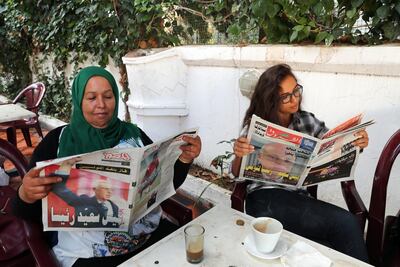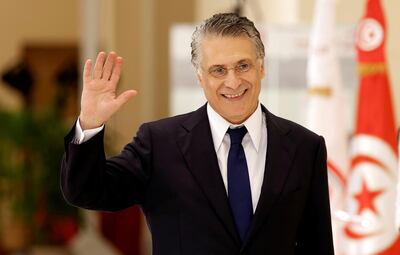Nearly a decade after the Arab revolutionary uprisings began, Tunisia continues to turn the ordinary – the political process to freely elect a new president and parliamentarians – into something extraordinary. Several winners emerged from Sunday's presidential election in Tunisia. The first, of course, is Kais Saied, who won by a shock landslide, with more than 72 per cent of the votes, according to exit polls.
The law professor came out of the blue, a relative unknown in a competition where his rival Nabil Karoui stood a good chance of winning, if only because the latter had far more financial muscle, assets and as a TV magnate, was a bigger name. Moreover, Mr Karoui represented the non-conservative option in a country where great swathes of the political elite pride themselves on the secularist inheritance of many of its modern politicians. If this election were about privilege and position, then Mr Karoui would have claimed an easy victory.
But it wasn’t about privilege nor position. Nor was it about some kind of binary competition, pitting secularists against Islamists. The election was about a great deal more than that. It was about how Tunisians want to distance themselves from the failures of established political figures and parties, and who they want to lead them into the future.

I recall many a time when I have been told, while visiting western capitals, that a free and open political transition of power rarely works in the Arab world. Tunisia shows that narrative simply isn't true. I have also heard the opinion expressed that Islamists do not support that sort of political process but in Tunisia, Islamists won a plurality of parliamentary seats in the first elections following the uprising – and rather than scupper the democratic experiment, they helped sustain it. Meanwhile, the two presidential candidates in this run-off contest sprang from decidedly non-Islamist backgrounds; indeed, the Islamist contenders fared poorly.
Many will then argue that Tunisia is exceptional. Except it was never deemed to be exceptional prior to 2011. On the contrary, the bigotries of low expectations were applied to Tunisians just as much as they were to any other community in the wider Arab world. If any exceptional qualities are to be ascribed to Tunisia, there are perhaps just two; firstly, the country has autonomy over its own political process, rather than extensive foreign interference. Secondly, because political power is so diffuse in the country, no one could hope to play a zero-sum game and win. So in that regard, Tunisians are again winners, proving the generalisers and essentialists about Arabs and Muslims wrong.
The future of the Tunisian project is still far from secure but there are some promising aspects to its political landscape. The first is demographic. As my colleague at the Carnegie Endowment for International Peace, Michele Dunne, reports, one Tunisian civil society worker told her: “We have an older generation that is still amazed that it can elect its representatives and a younger generation for whom this has become normal and expected.” That younger generation – 90 per cent of whom voted for Mr Saied in the run-off – form the majority of the population and free and fair Tunisian elections, still a relatively new process, will, over time, become the norm for them.

So the winner is not just Mr Saied. It is the political experiment in Tunisia that has emerged victorious and the fact that such an election could take place, with wide support, substantial participation and an absence of violence. That kind of peaceful transition is not to be taken for granted.
Is Mr Saied the best candidate for the job? That remains to be seen – because most policy issues that voters would normally want to hear about are still, as yet, unknown. But he has certainly gained the confidence of different factions already, including Ennahda, the centrist group that has shown itself to be committed to the political process in Tunisia, as well as a number of left-wing groups. At times like this, reputations take on all sorts of forms, often appearing as hagiography – but it will be his performance in the coming months that will see whether he has the right mettle. Moreover, he will have to work with a parliament and a prime minister that represent no single party, because of the outcome of the parliamentary elections last month. The challenges of doing so, particularly given the economic and security issues that the country faces, are mammoth indeed.
And yet, all these challenges are being mediated via institutions that all citizens have access to. Change is happening in Tunisia. The fabric of political life is being woven before our eyes and history is in the making. This is happening not because of violence on the streets, nor even the threat of upheaval. It is happening peacefully, in ways that would be the envy of many democracies in the West. The real winner is Tunisia.
Dr HA Hellyer is a senior associate fellow at the Royal United Services Institute and the Carnegie Endowment for International Peace





